La guerre contre les drogues: La paix et la sécurité minées
Ce document de « Count the Costs » explore la manière dont l'ONU cherche à promouvoir la sécurité de ses Etats membres en mettant en œuvre un système de contrôle des drogues qui considère la consommation de drogues comme une « menace existentielle » pour la société. Pour en savoir plus, en anglais, veuillez lire les informations ci-dessous.
Abonnez-vous à l'Alerte mensuelle de l'IDPC pour recevoir des informations relatives à la politique des drogues.
The global war on drugs has been fought for 50 years, without preventing the long-term trend of increasing drug production, supply and use. But beyond this failure to achieve its own stated aims, the drug war has also produced a range of serious, negative costs. Many of these costs have been identified by the United Nations Office on Drugs and Crime (UNODC) – the very UN agency that oversees the system responsible for them – and are described as the ‘unintended consequences’ of the war on drugs.1 They may have been unintended, but after more than 50 years, they can no longer be seen as unanticipated. These costs are also distinct from those relating to drug use, stemming as they do from the choice of a punitive enforcement-led approach.
This Count the Costs briefing explores how the UN seeks to promote the security of its member states through implementing a drug control system that treats the use of certain drugs as an ‘existential threat’ to society. The briefing will demonstrate, however, that this approach is fatally undermining international peace and security.
There is naturally overlap with other areas of the Count the Costs project, including: development, human rights, health, crime and economics.
For the full range of thematic briefings and the Alternative World Drug Report, please click here.
Keep up-to-date with drug policy developments by subscribing to the IDPC Monthly Alert.
